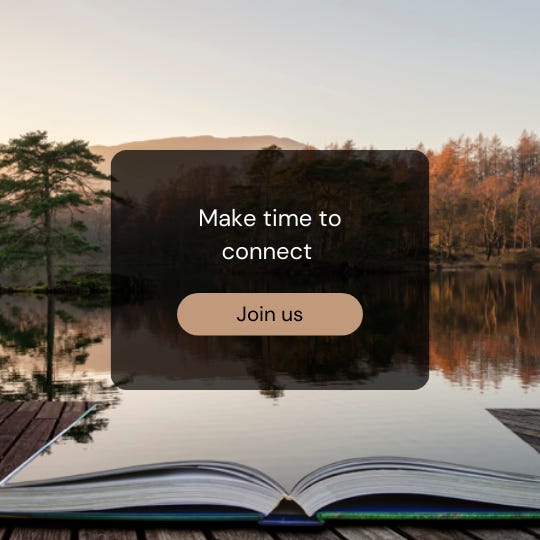Welcome to the “Discovering Mindful Writers Q&A”. Each month, a guest writer answers the same seven questions about their writing life. When I came up with the idea for this series last year, I had no idea that it would prove so popular! It has been great to connect with so many new people both through those who appear in the interview and in the comments that their answers prompt. I answered them myself recently and it was a very interesting exercise to answer my own questions! The schedule is full until the end of the year now so I will open up for new guests again in the Autumn.
This month I’m delighted to welcome
— a forest therapy guide, writer, nature-lover, life coach, and single mama of three boys. She writes Incurably Human about the ups, downs, and in-betweens of being human. It started life as a place where she offered support, encouragement, and community for Covid-19 long-haulers and she now also shares chapters from her novel, All Is Well. Lisa also writes 100 Poems where she shares her own poetry and provides poetry prompts and craft discussions.I hope you enjoy finding out more about her mindful writing journey. I love so many things about her answers here - building bridges with her words, the spaciousness of writing that isn’t actually the physical act of putting words on the page, and being a kind word in somebody’s heart. Do let us know what you think in the comments.
With love,
What does mindful writing mean to you?
I love the phrasing of this question because it soothes the noisy child in my brain, who is tugging on my shirtsleeve, insisting, “We can’t write this piece! I mean, do we even know what the technical definition of ‘mindful’ is?”
Mindful writing, to me, means writing that includes this inner, anxious child—writing that holds space for the entire glorious tangle of our humanness and the astonishing, gorgeous web of a world in which we live. Mindful writing, as I understand it, requires that I be awake to my life. That I inhabit my body. That I deeply attend to the physical space I’m in. That I soften my attachment to thoughts so that I can feel the aching aliveness that precedes words. I try to let the wordless parts of me do most of the work. My hope is always that if I do this, then the words that surface will continue to drip with aliveness even after they’re pressed to the page.
How does a mindful writing practice fit into your wider mindfulness journey?
I’ll tell you how I started writing poetry because I think it illustrates the connection. Before getting sick with long Covid in March 2020, I was very active. I loved being out in nature, but I was usually moving vigorously—hiking, trail running, rock climbing, etc. Injuries had given me glimpses into the magic of being out in nature and not moving, but this awareness sat at the periphery of my go-go-go life. And then all of a sudden, my body became a perpetual stop sign. Everything I thought I knew about myself vanished overnight.
All I had was the moment I was in. It was excruciating, and also, I have never felt more acutely alive. I couldn’t run, but I could lie down in the grass and watch the clouds. On days when I was well enough to walk, everything, every tender detail of the mud-brown fields, was beautiful enough to make me cry. I ended up training as a Forest Therapy Guide, even though I didn’t know if I’d ever be well enough to actually lead walks. My experiences in the training deepened my sensory awareness still further. Out in nature, words started appearing like sudden wildflowers in my mind. A phrase here, a sentence there. Words to describe a particular slant of light or a sudden flutter of wings or a sudden beating of my heart. Sometimes I would type them into my phone.
I began to wonder if these words could be the beginning of poems. I knew very little about poetry, but I felt pulled. Like something within me or something in the natural world or something that saw no difference between the two was saying this, this, this and here, here, here. I started writing poems from these sudden, unbidden wellings of words.
This is still more or less how I write most of my poems. My dog Jeff and I head out for a walk on the farm where I live. I listen to the grass crunching beneath my feet, tilt my head back to inhale the sky, touch a hand to moss or leaves or the bark of trees. I imagine my pores opening, my whole being opening, I invite the world to flood in. Sometimes, words arrive within that flood. When they do, I jot them down. Sometimes I end up with a full poem before I ever make it back home. Other days, no words come at all, and that’s fine. Maybe I just cry or laugh or chat with a tree or find a tiny flower whose name I don’t know. That’s every bit as delicious. The magic isn’t the outcome, measured in syllables—it’s the experience of paying attention, of opening, of feeling myself woven into this world.
Approaching mindfulness in this way enhances my writing, and approaching writing in this way enhances my mindfulness. It’s a lovely loop.
What do you write? Essays, poetry, fiction, plays?
I mostly write poetry and fiction. My fiction writing occurs at a desk, but my approach—at an energetic level—feels the same as my approach to poetry. I’m currently seeking a home for my first novel while also beginning a second one.
What drives you to write?
I think I’m trying to build bridges out of words. When I’m journaling, I’m crafting bridges between the wisest, most loving part of me and all the other (often noisy) parts. When I’m writing a poem inspired by nature, it feels like I’m already sitting on a bridge, like the whole world is defined by its interconnectedness, and I’m just trying to honor that with language. But every poem or work of fiction is also an attempt at building a bridge between me, with my experiences, and a reader, with their experiences. I want to say you’re not alone. I want to say I’ll sit by you while you feel this thing you have to feel. And because I usually feel a lot of joy and awe and delight in my life, I also want to say here, have some of this.
What stops you from writing?
Oh, so many things! I’m a single mom of three kids, so busyness is definitely a factor, and energy limitations and brain fog come into play, too. And then there’s fear, which I can easily pretend is something else, since there are always plenty of things on my to do list that I can use as instruments of avoidance. But mindfulness is such a gift here because if I’m present in my body and present with myself, then even though fear might be part of my experience, it cannot run the show. I take a long, slow walk with my dog on the farm where I live just about every day, I journal every morning, and I practice yoga most evenings. All of these have become spaces where I check in with myself and offer my fear cuddles and cookies to calm her down.
To all this I want to add, though, that I really believe the moments we spend pressing a pencil to the page or clicking keys at the computer are just the tip of the iceberg when it comes to writing—or at least when it comes to the kinds of writing I favor. If I am present with my children, awake to the soapsuds as I’m washing dishes, alive to the sensations of illness, and gentle with the stories that clamor so eagerly for real estate in my mind, then I will be present, awake, alive when I show up to the page. Invariably, I find that my subconscious has been working things out and that the spaciousness I’ve cultivated has opened gaps through which that wisdom, pressurized by the passage of time, can bubble to the surface.
What do you hope to achieve with your writing?
I want to be a kind voice in someone’s ear—or better yet, a kind voice in someone’s heart. I want my words to kindle tiny flames—to inspire a reader to pen their first poem or press pause on their own self-criticism or slip off their shoes and sink their toes into moss. I want someone to read my words and, for a fleeting moment, remember their own aliveness. I want them to feel the electric recognition that they are part of something astonishing and beautiful. You, whoever you are, are part of something astonishing and beautiful. None of us have ever, even for a second, existed in isolation. We are as deeply interconnected as the individual waves within an ocean. Maybe it seems like a humble goal—to offer readers an embodied remembering of such basic truths. But in this loudly screeching world, it’s probably actually kind of audacious.
How do you write? Are you a planner or do you just start writing from an idea and let it lead you?
I am mostly a pantser, as in flying by the seat of my pants, except that I don’t think it’s my pants calling the shots. It feels like I’m pulled along by my gut or heart or a mysterious, loving connection with something beyond me that I can’t define. I write that way, and I try to live my life that way, too.
Thanks so much for your time and sharing your insights and inspirations, Tara.
Next month’s guest is
who writes Wild Quiet Folk, where she invites us to escape into the wild world around us, and celebrate the curious, the quiet, and the overlooked.Read previous interviews in the series here.
Thank you for reading The Mindful Writer. If you enjoy my posts and would like to commit to a slower, more mindful writing practice, please consider becoming a supporter for only £5 a month. You’ll get a Mindful Writing Ebook, monthly Zoom Mindful Writing Marathons, and monthly in-depth “The Writing Sanctuary” posts that can help you connect more deeply to yourself, your craft, our human family and the world we live in.
Or you can buy me a cup of tea to say thanks for the posts!








A beautiful interview as ever!
What a lovely, heart-centric interview. Thank you both. 💝